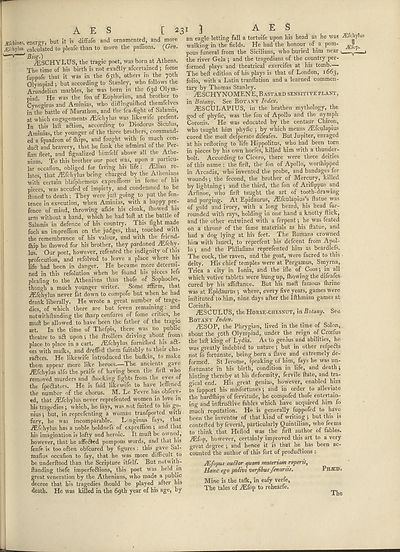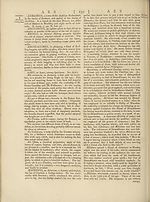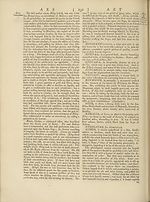Encyclopaedia Britannica, or, a Dictionary of arts, sciences, and miscellaneous literature : enlarged and improved. Illustrated with nearly six hundred engravings > Volume 1, A-AME
(255) Page 231
Download files
Complete book:
Individual page:
Thumbnail gallery: Grid view | List view

AES [23
^chines, energy, but it is diffufe and ornamented, and more
jEfchylus. calculated to pleafe than to move the paffions. {Gen.
" Biog.') , . .
iESCHYLUS, the tragic poet, was born at Athens.
The time of his birth is not exactly afcertained; fome
fuppofe that it was in the 65th, others in the 70th
Olympiad; but according to Stanley, who follows the
Arundelian marbles, he was born in the 63d Olym¬
piad. He was the fon of Euphorian, and brother to
Cynegirus and Aminias, who diftinguilhed themfelves
in the battle of Marathon, and the fea-fight of Salamis,
at which engagements iEfchylus was likewife prefent.
In this lalt action, according to Diodorus Siculus,
Aminias, the younger of the three brothers, command¬
ed a fquadron of (hips, and fought with fo much con-
duft and' bravery, that he funk the admiral of the Per-
fian fleet, and fignalized himfelf above all the Athe¬
nians. To this brother our poet was, upon a particu¬
lar occafion, obliged for faving his life: i®han re¬
lates, that TEfchylus being charged by the Athenians
with certain blafphemous expreflions in fome of his
pieces, was accufed of impiety, and condemned to be
ftoned to death : They were juft going to put the fen-
tence in execution, when Aminias, with a happy pre¬
fence of mind, throwing afide his cloak, Ihowed his
arm without a hand, which he had loft at the battle of
Salamis in defence of his country. This fight made
fuch an impreflion on the judges, that, touched with
the remembrance of his valour, and with the friend-
(hip he (bowed for his brother, they pardoned iTTchy-
lus. Our poet, however, refented the indignity of this
profecution, and refolved to leave a place where his
life had been in danger. He became more determi-
ned in this refolution when he found his pieces lefs
pleafing to the Athenians than thofe of Sophocles,
though a much younger writer. Some affirm, that
./Efchylus never fat down to compofe but when he had
drank liberally. He wrote a great number .of trage¬
dies, of which there are but feven remaining: and
notwithftanding the (harp cenfures of fome critics, he
muft be allowed to have been the father of the tragic
art. In the time of Thefpis, there was no public
theatre to a& upon ; the ftrollers driving about from
place to place in a cart. ./Efchylus furnifhed hjs act¬
ors with ma(ks, and dreffed them fuitably to their cha¬
racters. He likewife introduced the bulkin, to make
them appear more like, heroes.— The ancients gave
iEfchylus alfo the praife of having been the firft who
removed murders and (hocking fights from the eyes of
the fpeCtators. He is faid likewife to have leflened
the number of the chorus. M. Le Fevre has obfery-
ed, that iEfcbylus never reprefented women in love in
his tragedies; which, he (ays, was not fuited to his ge¬
nius ; but, in reprefenting a woman tranfported with
fury, he was incomparable. Longinus fays, that
^Efchylus has a noble boldnefs of expreffion ; and that
his imagination is lofty and heroic. It muft be owned,
however, that he affeCVed pompous words, and that his
fenfe is too often obfcured by figures : this gave Sal-
mafius occafion to fay, that he was more difficult to
be underftood than the Scripture itfelf. But notwith¬
ftanding thefe imperfedions, this poet was held in
great veneration by the Athenians, who made a public
decree that his tragedies (hould be played after his
death. He was killed in the 69th year of his age, by
Aftbp.
i ^ AES
an eagle letting fall a tortoife upon his head as he was JEfchylus
walking in the fields. He had the honour of a pom¬
pous funeral from the Sicilians, who buried him near
the river Gela ; and the tragedians of the country per¬
formed plays and theatrical exercifes at his tomb.-—
The belt edition of his plays is that of London, 1663,
folio, with a Latin tranflation and a learned commen¬
tary by Thomas Stanley.
yESCHYNOMENE, Bastard sensitive plant,
in Botany. See Botany Index.
yESCULAPIUS, in the heathen mythology, the
god of phyfic, was the fon of Apollo and the nymph
Coronis. He was educated by the centaur Chiron,
who taught him phyfic ; by which means yEfculapius
cured the moft defperate difeafes. But Jupiter, enraged
at his reftoring to life Hippolitus, who had been torn
in pieces by his owTn horfes, killed him with a thunder¬
bolt. According to Cicero, there were three deities
of this name : the firft, the fon of Apollo, worlhipped
in Arcadia, who invented the probe, and bandages for
wounds; the fecond, the brother of Mercury, killed
by lightning; and the third, the fon of Arifippus and
Arfinoe, who firft taught the art of. tooth-drawing
and purging. At Epidaurus, ./Efculapius’s ftatue was
of gold and ivory, with a long beard, his head fur-
rounded with rays, holding in one hand a knotty flick,
and the other entwined with a ferpent; he was feated
on a throne of the fame materials as his ftatue, and
had a dog lying at his feet. Fhe Romans crowned
him with laurel, to reprefent his defcent from Apol¬
lo ; and the Phliafians reprefented him as beardlefs.
The cock, the raven, and the goat, were facred to this
deity. His chief temples were at Pergamus, Smyrna,
Trica a city in Ionia, and the ifle of Coos; in all
which votive tablets were hungup, (bowing the difeafes
cured by his affiftance. But his moft famous (brine
was at Epidaurus ; where, every five years, games were
inftituted to him, nine days after the Ifthmian games at
Corinth.
iESCULUS, theHoRSE-CHESNUT, in Botany. See
Botany Index.
TESOP, the Phrygian, lived in the time of Solon,
about the 50th Olympiad, under the reign of Croefus
the laft king of Lydia. As to genius and abilities, he
was greatly indebted to nature ; but in other refpe£ts
not fo fortunate, being born a (lave and extremely de¬
formed. St Jerome, (peaking of him, fays he was un¬
fortunate in his birth, condition in life, and death;
hinting thereby at his deformity, fervile date, and tra¬
gical end. His great genius, however, enabled him
to fupport his misfortunes ; and in order to alleviate
the hardftiips of fervitude, he compofed thofe entertain¬
ing and inftru&ive fables which have acquired him fo
much reputation. He is generally fuppofed to have
been the inventor of that kind of writing ; but this is
contefted by feveral, particularly Quintilian, who feems
to think that Hefiod was the firft author of fables.
iEfop, however, certainly improved this art to a very
great degree ; and hence it is that he has been ac¬
counted the author of this fort of productions :
JEfopus auclor quam materiam reperit,
Hanc ego polivi verjibus fenanis.
Mine is the tafk, in eafy verfe,
The tales of iEfop to rehearfe.
Piled.
The
^chines, energy, but it is diffufe and ornamented, and more
jEfchylus. calculated to pleafe than to move the paffions. {Gen.
" Biog.') , . .
iESCHYLUS, the tragic poet, was born at Athens.
The time of his birth is not exactly afcertained; fome
fuppofe that it was in the 65th, others in the 70th
Olympiad; but according to Stanley, who follows the
Arundelian marbles, he was born in the 63d Olym¬
piad. He was the fon of Euphorian, and brother to
Cynegirus and Aminias, who diftinguilhed themfelves
in the battle of Marathon, and the fea-fight of Salamis,
at which engagements iEfchylus was likewife prefent.
In this lalt action, according to Diodorus Siculus,
Aminias, the younger of the three brothers, command¬
ed a fquadron of (hips, and fought with fo much con-
duft and' bravery, that he funk the admiral of the Per-
fian fleet, and fignalized himfelf above all the Athe¬
nians. To this brother our poet was, upon a particu¬
lar occafion, obliged for faving his life: i®han re¬
lates, that TEfchylus being charged by the Athenians
with certain blafphemous expreflions in fome of his
pieces, was accufed of impiety, and condemned to be
ftoned to death : They were juft going to put the fen-
tence in execution, when Aminias, with a happy pre¬
fence of mind, throwing afide his cloak, Ihowed his
arm without a hand, which he had loft at the battle of
Salamis in defence of his country. This fight made
fuch an impreflion on the judges, that, touched with
the remembrance of his valour, and with the friend-
(hip he (bowed for his brother, they pardoned iTTchy-
lus. Our poet, however, refented the indignity of this
profecution, and refolved to leave a place where his
life had been in danger. He became more determi-
ned in this refolution when he found his pieces lefs
pleafing to the Athenians than thofe of Sophocles,
though a much younger writer. Some affirm, that
./Efchylus never fat down to compofe but when he had
drank liberally. He wrote a great number .of trage¬
dies, of which there are but feven remaining: and
notwithftanding the (harp cenfures of fome critics, he
muft be allowed to have been the father of the tragic
art. In the time of Thefpis, there was no public
theatre to a& upon ; the ftrollers driving about from
place to place in a cart. ./Efchylus furnifhed hjs act¬
ors with ma(ks, and dreffed them fuitably to their cha¬
racters. He likewife introduced the bulkin, to make
them appear more like, heroes.— The ancients gave
iEfchylus alfo the praife of having been the firft who
removed murders and (hocking fights from the eyes of
the fpeCtators. He is faid likewife to have leflened
the number of the chorus. M. Le Fevre has obfery-
ed, that iEfcbylus never reprefented women in love in
his tragedies; which, he (ays, was not fuited to his ge¬
nius ; but, in reprefenting a woman tranfported with
fury, he was incomparable. Longinus fays, that
^Efchylus has a noble boldnefs of expreffion ; and that
his imagination is lofty and heroic. It muft be owned,
however, that he affeCVed pompous words, and that his
fenfe is too often obfcured by figures : this gave Sal-
mafius occafion to fay, that he was more difficult to
be underftood than the Scripture itfelf. But notwith¬
ftanding thefe imperfedions, this poet was held in
great veneration by the Athenians, who made a public
decree that his tragedies (hould be played after his
death. He was killed in the 69th year of his age, by
Aftbp.
i ^ AES
an eagle letting fall a tortoife upon his head as he was JEfchylus
walking in the fields. He had the honour of a pom¬
pous funeral from the Sicilians, who buried him near
the river Gela ; and the tragedians of the country per¬
formed plays and theatrical exercifes at his tomb.-—
The belt edition of his plays is that of London, 1663,
folio, with a Latin tranflation and a learned commen¬
tary by Thomas Stanley.
yESCHYNOMENE, Bastard sensitive plant,
in Botany. See Botany Index.
yESCULAPIUS, in the heathen mythology, the
god of phyfic, was the fon of Apollo and the nymph
Coronis. He was educated by the centaur Chiron,
who taught him phyfic ; by which means yEfculapius
cured the moft defperate difeafes. But Jupiter, enraged
at his reftoring to life Hippolitus, who had been torn
in pieces by his owTn horfes, killed him with a thunder¬
bolt. According to Cicero, there were three deities
of this name : the firft, the fon of Apollo, worlhipped
in Arcadia, who invented the probe, and bandages for
wounds; the fecond, the brother of Mercury, killed
by lightning; and the third, the fon of Arifippus and
Arfinoe, who firft taught the art of. tooth-drawing
and purging. At Epidaurus, ./Efculapius’s ftatue was
of gold and ivory, with a long beard, his head fur-
rounded with rays, holding in one hand a knotty flick,
and the other entwined with a ferpent; he was feated
on a throne of the fame materials as his ftatue, and
had a dog lying at his feet. Fhe Romans crowned
him with laurel, to reprefent his defcent from Apol¬
lo ; and the Phliafians reprefented him as beardlefs.
The cock, the raven, and the goat, were facred to this
deity. His chief temples were at Pergamus, Smyrna,
Trica a city in Ionia, and the ifle of Coos; in all
which votive tablets were hungup, (bowing the difeafes
cured by his affiftance. But his moft famous (brine
was at Epidaurus ; where, every five years, games were
inftituted to him, nine days after the Ifthmian games at
Corinth.
iESCULUS, theHoRSE-CHESNUT, in Botany. See
Botany Index.
TESOP, the Phrygian, lived in the time of Solon,
about the 50th Olympiad, under the reign of Croefus
the laft king of Lydia. As to genius and abilities, he
was greatly indebted to nature ; but in other refpe£ts
not fo fortunate, being born a (lave and extremely de¬
formed. St Jerome, (peaking of him, fays he was un¬
fortunate in his birth, condition in life, and death;
hinting thereby at his deformity, fervile date, and tra¬
gical end. His great genius, however, enabled him
to fupport his misfortunes ; and in order to alleviate
the hardftiips of fervitude, he compofed thofe entertain¬
ing and inftru&ive fables which have acquired him fo
much reputation. He is generally fuppofed to have
been the inventor of that kind of writing ; but this is
contefted by feveral, particularly Quintilian, who feems
to think that Hefiod was the firft author of fables.
iEfop, however, certainly improved this art to a very
great degree ; and hence it is that he has been ac¬
counted the author of this fort of productions :
JEfopus auclor quam materiam reperit,
Hanc ego polivi verjibus fenanis.
Mine is the tafk, in eafy verfe,
The tales of iEfop to rehearfe.
Piled.
The
Set display mode to:
![]() Universal Viewer |
Universal Viewer | ![]() Mirador |
Large image | Transcription
Mirador |
Large image | Transcription
Images and transcriptions on this page, including medium image downloads, may be used under the Creative Commons Attribution 4.0 International Licence unless otherwise stated. ![]()
| Permanent URL | https://digital.nls.uk/193135300 |
|---|
| Attribution and copyright: |
|
|---|
| Description | Ten editions of 'Encyclopaedia Britannica', issued from 1768-1903, in 231 volumes. Originally issued in 100 weekly parts (3 volumes) between 1768 and 1771 by publishers: Colin Macfarquhar and Andrew Bell (Edinburgh); editor: William Smellie: engraver: Andrew Bell. Expanded editions in the 19th century featured more volumes and contributions from leading experts in their fields. Managed and published in Edinburgh up to the 9th edition (25 volumes, from 1875-1889); the 10th edition (1902-1903) re-issued the 9th edition, with 11 supplementary volumes. |
|---|---|
| Additional NLS resources: |
|

